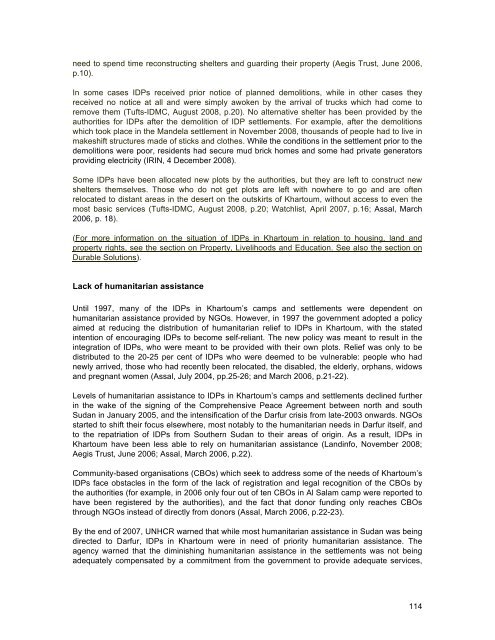SUDAN: Durable solutions elusive as southern IDPs return and ...
SUDAN: Durable solutions elusive as southern IDPs return and ...
SUDAN: Durable solutions elusive as southern IDPs return and ...
You also want an ePaper? Increase the reach of your titles
YUMPU automatically turns print PDFs into web optimized ePapers that Google loves.
need to spend time reconstructing shelters <strong>and</strong> guarding their property (Aegis Trust, June 2006,<br />
p.10).<br />
In some c<strong>as</strong>es <strong>IDPs</strong> received prior notice of planned demolitions, while in other c<strong>as</strong>es they<br />
received no notice at all <strong>and</strong> were simply awoken by the arrival of trucks which had come to<br />
remove them (Tufts-IDMC, August 2008, p.20). No alternative shelter h<strong>as</strong> been provided by the<br />
authorities for <strong>IDPs</strong> after the demolition of IDP settlements. For example, after the demolitions<br />
which took place in the M<strong>and</strong>ela settlement in November 2008, thous<strong>and</strong>s of people had to live in<br />
makeshift structures made of sticks <strong>and</strong> clothes. While the conditions in the settlement prior to the<br />
demolitions were poor, residents had secure mud brick homes <strong>and</strong> some had private generators<br />
providing electricity (IRIN, 4 December 2008).<br />
Some <strong>IDPs</strong> have been allocated new plots by the authorities, but they are left to construct new<br />
shelters themselves. Those who do not get plots are left with nowhere to go <strong>and</strong> are often<br />
relocated to distant are<strong>as</strong> in the desert on the outskirts of Khartoum, without access to even the<br />
most b<strong>as</strong>ic services (Tufts-IDMC, August 2008, p.20; Watchlist, April 2007, p.16; Assal, March<br />
2006, p. 18).<br />
(For more information on the situation of <strong>IDPs</strong> in Khartoum in relation to housing, l<strong>and</strong> <strong>and</strong><br />
property rights, see the section on Property, Livelihoods <strong>and</strong> Education. See also the section on<br />
<strong>Durable</strong> Solutions).<br />
Lack of humanitarian <strong>as</strong>sistance<br />
Until 1997, many of the <strong>IDPs</strong> in Khartoum’s camps <strong>and</strong> settlements were dependent on<br />
humanitarian <strong>as</strong>sistance provided by NGOs. However, in 1997 the government adopted a policy<br />
aimed at reducing the distribution of humanitarian relief to <strong>IDPs</strong> in Khartoum, with the stated<br />
intention of encouraging <strong>IDPs</strong> to become self-reliant. The new policy w<strong>as</strong> meant to result in the<br />
integration of <strong>IDPs</strong>, who were meant to be provided with their own plots. Relief w<strong>as</strong> only to be<br />
distributed to the 20-25 per cent of <strong>IDPs</strong> who were deemed to be vulnerable: people who had<br />
newly arrived, those who had recently been relocated, the disabled, the elderly, orphans, widows<br />
<strong>and</strong> pregnant women (Assal, July 2004, pp.25-26; <strong>and</strong> March 2006, p.21-22).<br />
Levels of humanitarian <strong>as</strong>sistance to <strong>IDPs</strong> in Khartoum’s camps <strong>and</strong> settlements declined further<br />
in the wake of the signing of the Comprehensive Peace Agreement between north <strong>and</strong> south<br />
Sudan in January 2005, <strong>and</strong> the intensification of the Darfur crisis from late-2003 onwards. NGOs<br />
started to shift their focus elsewhere, most notably to the humanitarian needs in Darfur itself, <strong>and</strong><br />
to the repatriation of <strong>IDPs</strong> from Southern Sudan to their are<strong>as</strong> of origin. As a result, <strong>IDPs</strong> in<br />
Khartoum have been less able to rely on humanitarian <strong>as</strong>sistance (L<strong>and</strong>info, November 2008;<br />
Aegis Trust, June 2006; Assal, March 2006, p.22).<br />
Community-b<strong>as</strong>ed organisations (CBOs) which seek to address some of the needs of Khartoum’s<br />
<strong>IDPs</strong> face obstacles in the form of the lack of registration <strong>and</strong> legal recognition of the CBOs by<br />
the authorities (for example, in 2006 only four out of ten CBOs in Al Salam camp were reported to<br />
have been registered by the authorities), <strong>and</strong> the fact that donor funding only reaches CBOs<br />
through NGOs instead of directly from donors (Assal, March 2006, p.22-23).<br />
By the end of 2007, UNHCR warned that while most humanitarian <strong>as</strong>sistance in Sudan w<strong>as</strong> being<br />
directed to Darfur, <strong>IDPs</strong> in Khartoum were in need of priority humanitarian <strong>as</strong>sistance. The<br />
agency warned that the diminishing humanitarian <strong>as</strong>sistance in the settlements w<strong>as</strong> not being<br />
adequately compensated by a commitment from the government to provide adequate services,<br />
114
















